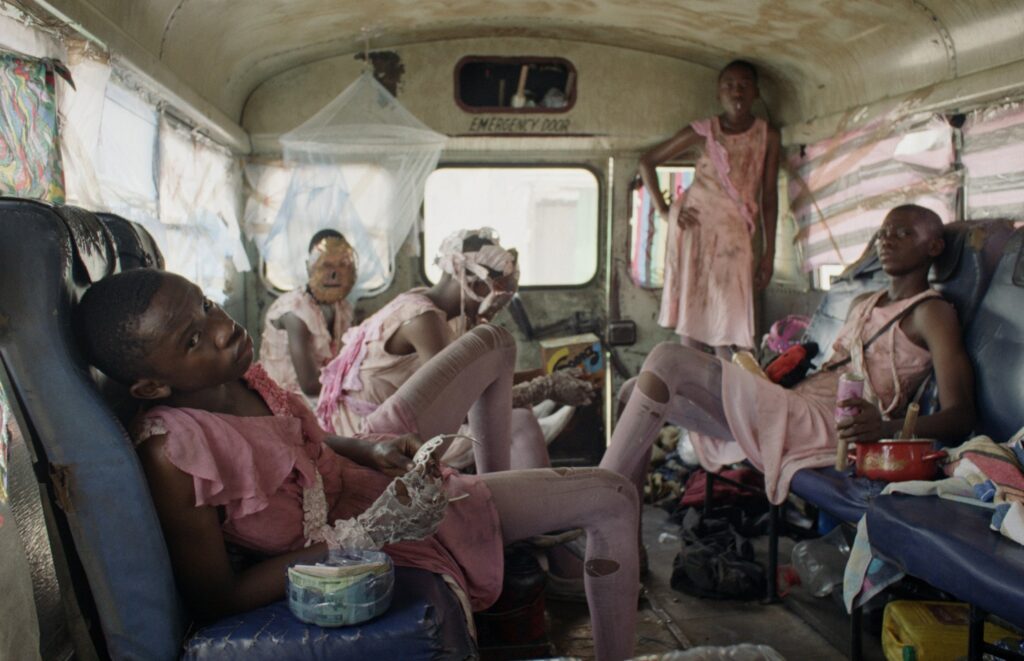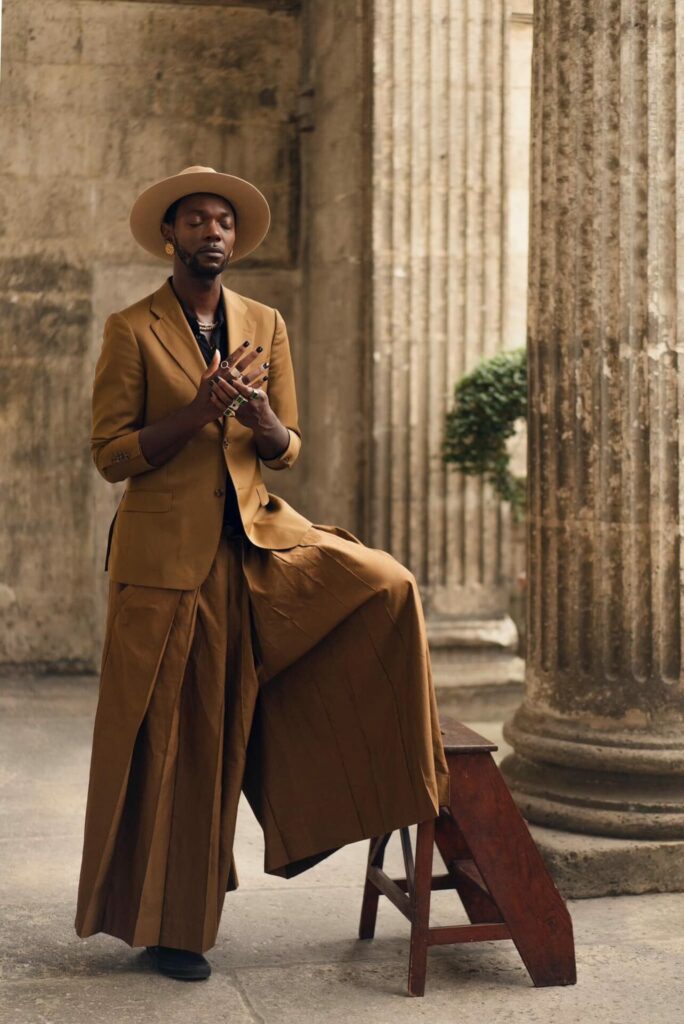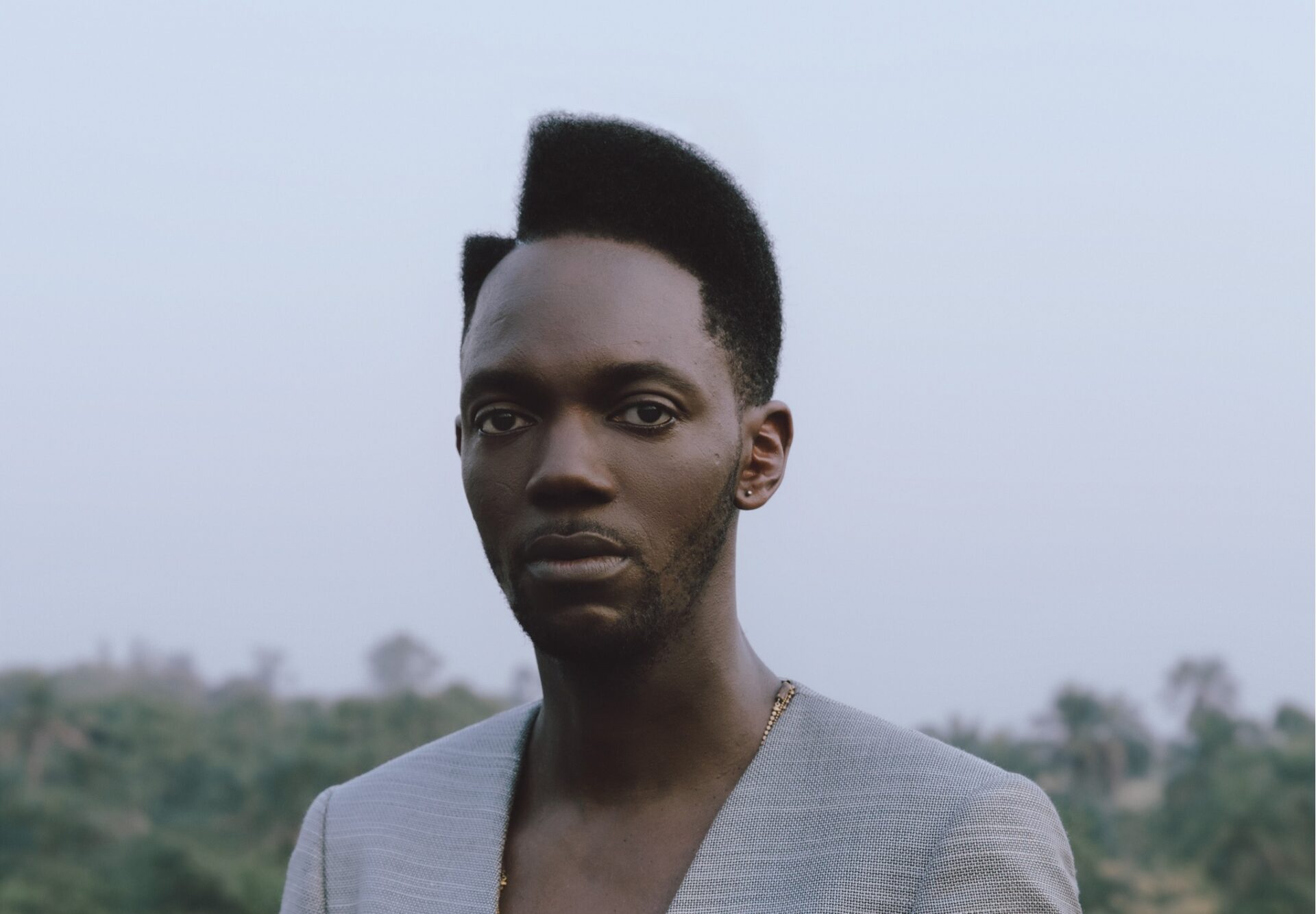Most filmmakers who finish a script do not then write four albums of songs inspired by their movie’s characters. But most filmmakers are not Baloji.
The Belgian-Congolese rapper is poised to release 36 songs that act as a companion to his magical-realist directorial debut Augure (also titled Omen) – for which he also designed the costumes and subsequently arranged the exhibition Augurism at Antwerp’s fashion museum. Running until next April, it is Baloji’s first solo exhibition in Belgium.
“In French, my favourite saying is Travailler avec le sérieux d'un enfant qui s'amuse, working with the seriousness of a kid having fun,” he says, flashing a brilliant smile. “There is something that has to be playful in everything you do.”
Baloji grins several times during our chat in Ghent, where he has lived for many years. Partly because he is amiable and upbeat, but he occasionally smiles politely to fill the silence following a short answer to a personal question. It’s a smile that means: “Nice try, but we are not going there.”
Baloji answers life’s more traumatic experiences through his work, sometimes candidly and sometimes more as an exploration – about identity, community, conflict, religion and the meaning of home. “My first love is poetry,” he says. “Everything originates with it. And then it takes different forms. A script, a song, an idea for clothes or for an exhibition.”
Augure won the New Voice prize at Cannes earlier this year and is Belgium’s official submission for an Oscar nomination for Best International Film next year. It follows four characters cast out by their communities, and like Baloji, they straddle both Africa and Europe.

Scene from Augure
But while Baloji is a filmmaker, stylist and fashion designer, he is best known for his music. “I consider music as poetry. You rhyme, you tell a story and use metaphor. Hip-hop has a lot of poetry. People like to simplify it with cliches, but I think it’s poetry,” he says.
Baloji, 43, found fame as a teenager in Liège with a group of rappers eventually known as Starflam. It was the 1990s, and critics and audiences embraced the French-speaking collective’s sounds, rocketing their second album Survivant to platinum.
He left the group in 2004 and released his solo album Hotel Impala three years later. He also honed his directing chops with short films, like 2018’s Zombies.
Man of science
Baloji was born Serge Baloji Tshiani in Lubumbashi, in Zaire, now the Democratic Republic of Congo. He was the product of a one-night stand between a local girl and a much older businessman. It was his father who named him, after an old friend: baloji means ‘man of science’ in Swahili.
“Typically, we used it to refer to a healer,” he explains. “With the onset of Christianity in Congo, baloji came to mean witchcraft, black magic. Now in the everyday language, it refers to evil spirits. So it’s not an easy name to live with. It’s like calling yourself demon or devil.” To this day, every time – every single time – he shows his passport to border control in Congo, they ask him if he realizes what it means. His father, he says, “didn’t think about the consequences.”
That can be said of many of his father’s subsequent actions: he picked up the three-year-old Baloji at childcare one day and simply disappeared with him. Without informing his mother, he took him to Belgium. “Because Europe was the El Dorado,” says Baloji. “A country where you have access to a lot of things. And socially it meant that you had succeeded if you were in Belgium.”
His father went back to Congo when Baloji was seven, leaving him with his stepmother. “He was moving back and forth, and we lost contact when I was about 14.” As for Baloji, he quit school and became a rapper.
It was only years later that he received word from his mother, who he had not seen nor heard from in 25 years. They exchanged letters and soon phone calls. “I just could not answer her when she asked: ‘Tell me about yourself, what is your life like, those 20-plus years away from me.’ You don’t dare say certain things. So I decided to make an album to tell her about my life in Belgium.”
A unique blend of hip-hop, soul and Afrobeat, Hotel Impala was an instant hit, hailed as much for its musicality as its honesty. Collaborative by nature, Baloji worked with several musicians on the album, including Gabriel Rios and DJ duo The Glimmers.
Since then, Baloji has worked and toured with an impressive line-up of musicians and producers, from Europe to Africa. While he plays a few instruments, like bass and keyboards, most of that work goes to collaborators, who also help him to rework his music, morphing it into something else entirely. This started right from his second solo album, Kinshasa Succursale, a mix of new music and the “Kinshasa version” of numbers from Hotel Impala, recorded with Congolese musicians.
Dresses and nail polish
It’s all part of his penchant for mishmashing musical genres. Hence the companion songs for Augure. He is also doing photography shoots in which he embodies all the characters, including the women. It is not unusual to see pictures of Baloji in brightly coloured skirts and dresses.

In one of his own designs
When we meet, he is wearing black nail polish and rings on every finger. Some fingers sport more than one ring, and the same ring returns more than once – set with a striking jade stone. “Power to the people” is emblazoned across his black leather cap; his sweater is colourful and oversized. That’s saying a lot: Baloji is well over six feet tall, usually towering over his fellow musicians and actors.
He rebuffs the suggestion that he plays with gender. “We have fingernails, why shouldn’t we paint them?” he asks before telling the story about one of his characters from Augure – Paco (Marcel Otete Kabeya), who wears a tattered pink dress and tiara. The leader of a (fairly harmless) gang of street youth, they all wear a version of the pink dress. It is a tribute to Paco’s sister, whose life was cut short.
“I know society has a problem with a man wearing a dress,” says Baloji. “And it was not easy to convince the actor – and his parents. We had to have four or five meetings with them. But when we did the first shoots, they were extremely happy wearing the dresses. They felt so free in them. I don’t want to question gender, but I want to work on the idea that feminism is also beneficial for men. We have to fight for that idea, it’s crucial. There is also pressure on men, connected to the way you have to behave and pretend and dress. That means you are not feeling comfortable because you have to represent something.”
This is at the heart of Augure, a movie about the self-imposed shackles of patriarchy and religion. It is the story of Koffi (Marc Zinga), who wants to marry his partner in Belgium, so they must travel to Koffi’s homeland of Congo to offer a kind of dowry to his father. Koffi has not been back since his departure nearly 20 years earlier, which has not gone over well with the family. The father is nowhere to be found, and the mother is distant. Fortunately, one of Koffi’s sisters is a free spirit who, as Baloji puts it, “bucks the system”. But when Koffi gets a nosebleed all over another sister’s newborn, it is seen as a curse, and all hell breaks loose.
Personal stories
It’s difficult, of course, not to draw parallels between Koffi and Baloji himself. “But that’s a mistake!” he insists. “I have the least empathy with Koffi. I see him as a character that helps you get to the other characters. You think the movie is going to be about him, but after 15 minutes, he’s not the subject anymore.”

Scene from Augure
The subjects, he says, and the film’s real victims, are Koffi’s sister and mother – “the ones who stay.” It takes until the end of the film to understand why the mother seems to reject her son – even in the absence of the father. “She’s dealing with these misogynistic codes that are playing against her. She hates her son because tradition is telling her to do so. That’s not her decision. It’s the whole of society that is telling her, this is bad, follow this.”
The family’s response to Koffi is rooted in the past, the assumption that he is the bearer of evil spirits. It parallels the story of street kid Paco, whose sister perished as a result of some kind of superstition. A fantastical Hansel and Gretel sequence puts the children in the hands of a witch, from which Paco escapes, while his sister does not.
“Witchcraft is the same whether you are in Africa or Europe,” states Baloji. “It always comes from the hands of a woman – usually a woman who doesn’t have kids. You can look to Disney even, it’s the same everywhere. The stepmother. The angry, mad woman. Always. I fight against it, these social structures and religious answers for things we cannot control.”
But does he worry that laying bare the consequences of a belief in black magic will stereotype his homeland? “I’m not judging. That would be a mistake,” he says firmly. “It’s a tradition, it’s the way people find an answer to the unknown. It’s the same in Europe. We pretend we are different, but we’re not. The streets bear the names of saints, we follow a Christian calendar, and there is a Christian political party. A few weeks ago, a million people were waiting for the Pope in Portugal. In Liège, they celebrate the Black Madonna. And nobody is calling them crazy. But we call African people crazy because we think that Africa is wild and savage.”
Both Baloji’s stepmother and father passed away recently. He is determined not to make the mistakes of his father (whose name he has dropped), living in Ghent to co-parent his 13-year-old daughter. The pair went to New York this year for Baloji’s birthday. “We always do something for my birthday. I love my daughter, and I’m here for her. To love somebody more than you love yourself is unique,” he says.

